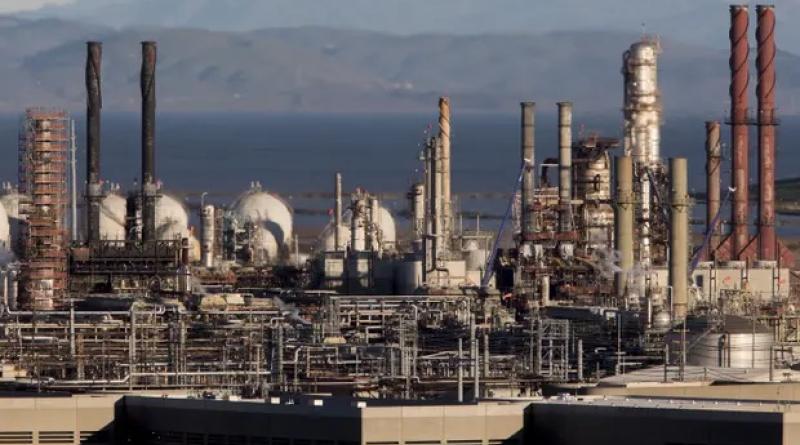‘Like a dam breaking’: experts hail decision to let US climate lawsuits advance

The decision, climate experts and advocates said, felt “like a dam breaking” after years of legal delays to the growing wave of climate lawsuits facing major oil companies.
Without weighing in on the merits of the cases, the supreme court on Monday rebuffed an appeal by major oil companies that want to face the litigation in federal courts, rather than in state courts, which are seen as more favorable to plaintiffs.
ExxonMobil Corp, Suncor Energy Inc and Chevron Corp had asked for the change of venue in lawsuits by the state of Rhode Island and municipalities in Colorado, Maryland, California and Hawaii.
Six years have passed since the first climate cases were filed in the US, and courts have not yet heard the merits of the cases as fossil fuel companies have succeeded in delaying them. In March, the Biden administration had argued that the cases belonged in state court, marking a reversal of the position taken by the Trump administration when the supreme court last considered the issue.
The Rhode Island attorney general, Peter Neronha, said his state was now finally preparing for trial after “nearly half a decade of delay tactics” by the industry. A joint statement from the California cities of Santa Cruz, San Mateo and Richmond and Marin county said the oil companies knew the dangers of fossil fuels but “deceived and failed to warn consumers about it even as they carried on pocketing trillions of dollars in profits”.
The cases have been compared to tobacco lawsuits in the 1990s that resulted in a settlement of more than $200bn and changed how cigarettes are advertised and sold in the US.
“It was a really amazing feeling to see that the supreme court was ruling in a very logical way by continuing with the unanimous decisions that have been made in the previous courts to not [grant petitions for review] and to allow these cases to move forward,” said Delta Merner, lead scientist at the Science Hub for Climate Litigation.
“It removes this dam that industry has been building to prevent these cases from being heard on their merits,” she said. “We can finally have the real conversations about what the industry knew and what their actions were despite that knowledge.”
She hopes communities will have the chance to speak in court about the climate emergencies they are experiencing as a result of the industry’s actions.
As jurisdictional battles have dragged on, climate emergencies have added up.
The Colorado case was filed in 2018. In 2021, the state saw the Marshall fire, the most destructive wildfire in its history, which killed two people, destroyed nearly 1,000 homes and businesses, contaminated drinking water and amounted to billions in damages.
“There’s real impacts that are happening now, and that’s why it’s so important for these cases to have the opportunity to be heard, and have a chance for justice,” Merner said.
The cases allege fossil fuel companies exacerbated climate change by concealing and misrepresenting the dangers associated with burning fossil fuels. The lawsuits say the companies created a public and private nuisance and violated state consumer protection laws by producing and selling fossil fuels despite knowing the products would cause devastating climate emergencies, including melting ice caps, dramatic sea level rise, and extreme precipitation and drought. Local governments are seeking damages for the billions of dollars they have paid for climate mitigation and adaptation.
The oil companies have denied the allegations.Financial accountability
“We were all pretty excited. It feels like justice might be possible,” Richard Wiles, president of the Center for Climate Integrity, said after reading the decision on Monday.
“There’s clearly trillions of dollars of damages in the US alone from climate change that has to be dealt with.”
The plaintiffs aren’t suing the companies to put them out of business, but the cases could ultimately affect the industry’s bottom line.
If the lawsuits are successful, they could limit the fossil fuel industry’s ability to greenwash and lie to consumers, Merner said. Rulings against the companies could also reinforce banking industry concerns that fossil fuels are a risky investment.
In state court, fossil fuel companies will attempt to have the cases dismissed.
The Chevron attorney Theodore Boutrous said in a statement he was confident the cases would be dismissed, arguing that climate change requires a coordinated federal response, “not a disjointed patchwork” of actions from numerous state courts. “These wasteful lawsuits in state courts will do nothing to advance global climate solutions, nothing to reduce emissions and nothing to address climate-related impacts,” he said.
“I don’t think there’s any reason for that confidence yet,” said Korey Silverman-Roati, climate law fellow at the Sabin Center for Climate Change Law, in response to Boutrous.
It’s unclear what will happen in state courts, but Silverman-Roati pointed to the Hawaii case, in which a state court denied the industry’s motion to dismiss.
If plaintiffs clear motions to dismiss, the cases move to discovery. The plaintiffs will use the process to try to gather more evidence of what the companies knew and when they knew it. Internal company documents will probably become public when the trials get under way.
Recent studies have shown that Exxon accurately predicted that its products would cause climate change.
Attribution science will play a key role in connecting local climate disasters to the industry’s responsibility. “Studies can explain how much hotter a heatwave is, or how much greater the intensity of a downpour is during a hurricane event due to climate change. And they can look to see where those emissions came from, and what percentage of those emissions tie into those direct climate impacts,” Merner said.
With each decision in favor of plaintiffs, the cases are snowballing and more local governments are filing new cases. “There’s a growing number of lawsuits. And I imagine after today, that will continue,” Merner said.
cover photo:The Chevron oil refinery in Richmond, California. Photograph: Jessica Christian/AP





